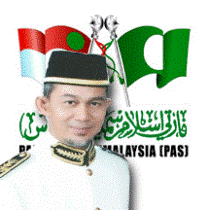AHLI POLITIK MALAYSIA PALING BANYAK RASUAH (siapa lagi..kalau tidak .)
>> 04 Jun 2009
 KUALA LUMPUR, June 3 — We may have voted them into office but the truth of the matter is, we don't think very highly of our politicians.
KUALA LUMPUR, June 3 — We may have voted them into office but the truth of the matter is, we don't think very highly of our politicians. Malaysians believe that politicians are the most corrupt group, according to a global survey by anti-graft body Transparency International (TI).
In the 2009 Global Corruption Barometer (GCB), 42 per cent of Malaysians said that political parties are the most corrupt institution, followed closely by the civil service at 37 per cent.
They are also not optimistic that graft will be curbed as two-thirds of Malaysians have no faith in the government's efforts to fight corruption.
TI Malaysia president Datuk Paul Low said that this was due to the fact that the public had no idea how political parties were funded.
"Corruption in politics is the mother of all corruption. Nobody knows how they are funded. They need to eliminate money politics as well as disclose their sources of funding," he said, adding that changes in electoral laws as well as compulsory audits would be needed to reverse public perception.
However, he felt that the results may not be accurate as the survey was conducted three months ago, amid speculation of monetary inducement that resulted in the Perak political crisis as well as vote-buying in the Umno party polls.
Low also called for better accessibility to information regarding government contracts and concession agreements as well as reviewing the Official Secrets Act as "these are not strategic interests" which could compromise national security.
Malaysia regularly scores close to five out of 10 on TI's Corruption Perception Index and last November's results left it ranked 47th out of 180 countries.
Despite the move to give further powers to the national anti-graft squad when it was converted from the Anti-Corruption Agency to the Malaysian Anti-Corruption Commission (MACC), 67 per cent of Malaysians still feel the government has been ineffective in dealing with corruption.
While Low said it was still too early to judge the MACC, he acknowledged public perception was that it practised selective prosecution and must instead "take the big fish along with the small fish." TI Malaysia would also attempt to conduct a public poll on its performance later this year.
Meanwhile, of Malaysians polled, only 9 per cent admitted to paying a bribe in the last 12 months, slightly below the global average of 13 per cent. Low noted that while three out of 10 Indonesians admitted to bribery, three-quarters felt their government has been effective in fighting graft.

"We can see that the Indonesian president has become more popular so it shows people value the intergrity of politicians," he said, referring to surveys showing Susilo Bambang Yudhoyono's popularity has increased ahead of this year's presidential elections.
Globally, political parties were considered by 29 per cent to be the most corrupt followed by the civil service at 26 per cent, while on average, 56 per cent felt their governments had not tackled graft well.
Also, respondents indicated an 8 per cent increase in the perception that the private sector is corrupt. Low said that companies should take heed to the fact that 50 per cent of Malaysians said they would prefer to purchase from "corruption-free" companies.
"The private sector should introduce anti-bribery and whistle-blowing policies as well as integrity agreements," he suggested.
He also said that while he was disappointed that Malaysia has not improved its corruption index for over eight years, he was encouraged by Prime Minister Datuk Seri Najib Razak's statements on graft so far as it was early days yet in his two-month-old administration.
Low said that TI Malaysia has been consulted by the government many times before and he would be submitting a copy of this year's GCB, its sixth edition and the first with Malaysian participation, to Najib and was hopeful of further discussions with the government on the matter.(THE MALAYSIAN INSIDER)

































































































































































1 ulasan:
Assalamualaikum, sudah terang lagi bersuluh. tidak syak lagi sistem politik Malaysia telah diserang oleh wabak rasuah. Kita lihat sejauh mana pentadbiran Najib dapat menghapuskan wabak rasuah. Turut terpalit sama sistem kehakiman Malaysia. Ini sungguh menyedihkan kerana integriti yang diharapkan dalam sistem kehakiman sudah pudar.
Catat Ulasan